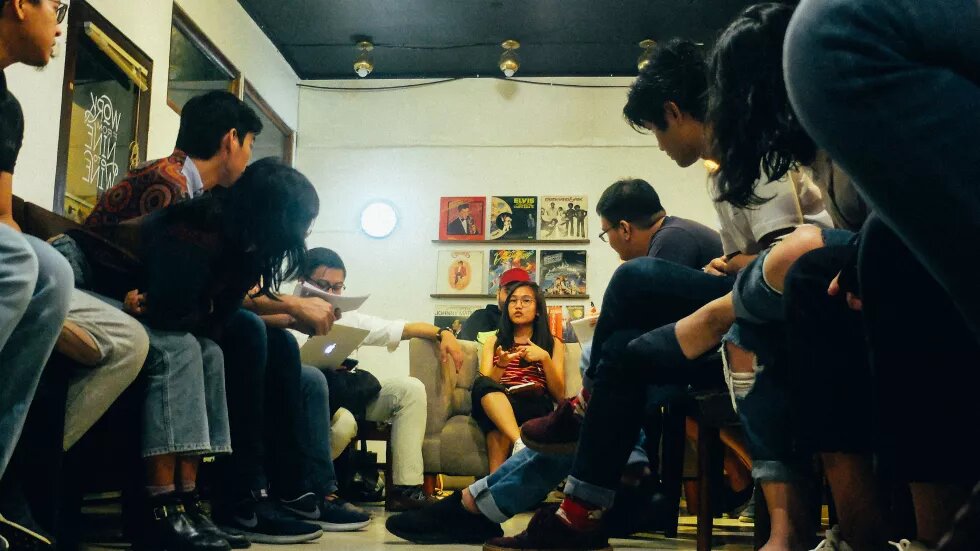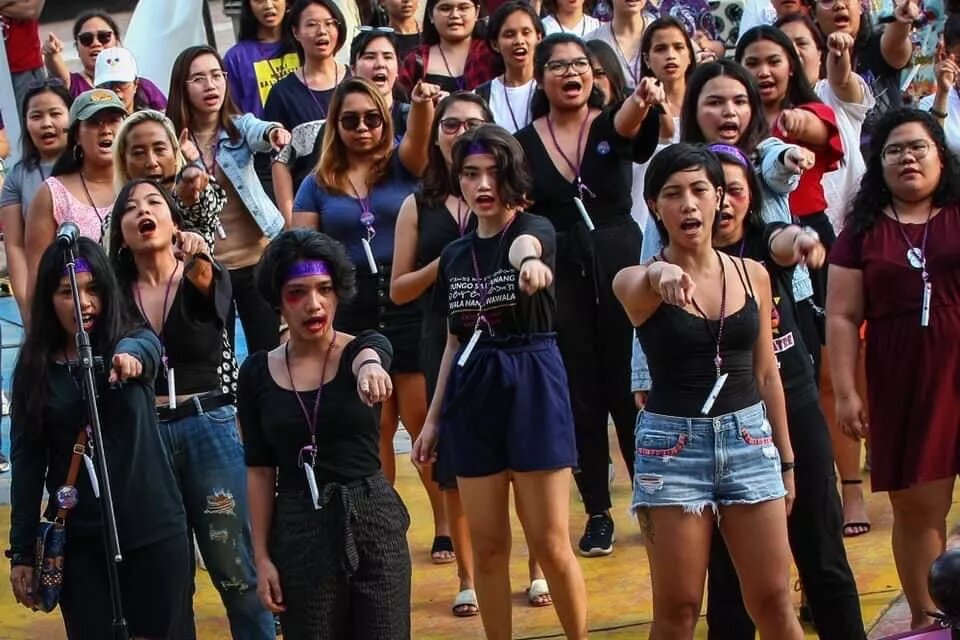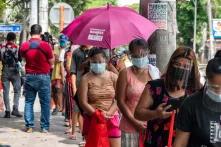
Educated on diverse gender perspectives by the internet and emboldened by global feminist movements like #MeToo, Filipino youth are boldly pushing the issues of body autonomy and sexuality to the frontlines of the struggle for gender equality. With social media as a platform for convergence, alliance and advocacy, they are treading territory that previous feminist movements shied away from.

This photo essay is part of our dossier "Young voices on the rise – Youth and democracy in the Asia-Pacific region".
At 15, while Arya Cabutihan’s classmates were writing essays about saving trees, she was advocating for Filipino teens to have access to sex education and birth control. Cabutihan leads Amarela, a youth-driven initiative to make sexual rights and reproductive health information accessible to young people. The Facebook-based group and its band of about 80 teen volunteers of diverse gender identities work in shifts to produce informational materials, organise talks, and hold webinars for their more than 14,000 followers. The core of their work revolves around stripping reproductive health information of development world jargon and medical tongue twisters, and transforming them into infographics. The result is bite-sized pieces of information translated into Filipino and other major Philippine languages packed with catchy text that is welcoming and friendly - and not intimidating to share - even if it is about, well, sex.
The information is much needed, urgent even. The government declared preventing teen pregnancy a “national priority”. An estimated 500 teens give birth every day and there is an alarmingly growing number of multiple teen pregnancies where teen mothers get pregnant a second or third time before the age of 20. According to Cabutihan, Amarela wants their social media posts to break down the class divide in reproductive health: “A lot of the existing reproductive health information is written in English and in a way that is not easy to understand. Some words don’t have direct translations to Filipino. Information is accessible only to certain social classes.” Cabutihan, and the leaders of Amarela, are convinced that encouraging thoughtful discussions about uncomfortable topics such as sex, birth control and consent are crucial to preventing mistimed pregnancies, but more importantly, to teaching teens the essentials of gender relations, such as consent and respect for boundaries. It is the kind of information teens need to have healthy relationships and to counter the pervasive sexism and misogyny that enable an environment for sexual violence. Government data shows that 1 in 20 Filipino women between the ages of 15-49 have experienced sexual violence in their lifetime.
Cabutihan, who is now 17 years old, says that: “Teens aren’t afraid anymore to start discussions about sex and even topics beyond sex. At the same time, we’re using these conversations as a platform to learn and educate others.” Teens are taking the issue of sexual health rights into their own hands, making up for the gaps in contradictory laws that either limit their access or disadvantage them. The existing reproductive health law is meant to liberalise access to contraceptive information and services but prohibits minors from availing of birth control services at government clinics without parental consent. Abortion is prohibited without exception and is a crime punishable by imprisonment. Medical complications resulting from unsafe abortions are a leading cause of maternal death. Only recently, legislators began a move to raise the age of sexual consent from 12 - one of the lowest in the world - to 16.
Personal, political, and sexual: The youth-driven feminist movement
Experts say that the trademark of the contemporary Filipino feminist movements is that it is youth-driven, deeply personal and boldly pushing the issue of body autonomy to the frontlines of the struggle for gender equality. In doing so, they are slowly chipping away at cultural norms where sexism, misogyny and the debasement of women and non-gender conforming people are embedded. Educated by the internet on diverse perspectives regarding gender, sexuality and inequality, and emboldened by global feminist movements like #MeToo, Filipino youth are using the online space as a convergence point for feminist awakenings, mobilisation and advocacy. According to Nathalie Africa-Verceles, director of the University of the Philippines Center for Women and Gender Studies: “Young people first read and learn about issues that anger them online. Their feminist conscience is awakened. But what are they going to do about these issues as individuals? They look for communities to be part of.” She added: “The internet is an extension of their real life.”
The Philippines is the top user of social media and the internet worldwide. Filipinos spend an average of 11 hours each day online; the global average for internet usage is about 7 hours. In the Philippine online space, there are countless Facebook groups, Instagram accounts and podcasts promoting the right to body autonomy alongside positive sexuality and fighting against being shamed for the intimate choices one makes in relation to one’s body. These movements question the double-edged sword often faced by sexual health and sex positivity advocates: you can advocate for sexual rights in the name of broader societal issues like development and gender equality but not in the name of the individual pursuit of pleasure and exploration of one’s sexuality. These Filipino feminists say that it does not have to be one or the other.
According to Cabutihan: “A lot of older feminists say that our advocacy is unnecessary. We are dismissed as acting out and going through a rebellious stage. We’re not taken seriously.” She also shared that members are either questioned about how they know so much about sex at such a young age or, conversely, accused that they don’t have enough experience to talk about sex. Perci Cendana, former commissioner of the National Youth Commission (NYC) and prominent LGBT rights activist, cites the focus on body autonomy and fighting against inflictions on personal space through everyday forms of harassment as “an articulation for safe spaces and a call for security in all locations: the physical, emotional, and psychological.” It marks the generational shift that differentiates youth-driven feminist movements and the movements that came before them. Cendana adds: “I am so very happy that young feminists are open to discussing issues of desire. This was not as prominent in previous feminist movements. Control over the body is important in developing and upholding women’s agency. Creating and claiming your own safe space is a very powerful assertion, especially in an environment where violence is prevalent.”
Youth leading its own version of the #MeToo Movement
While the focus on body autonomy and carving out safe spaces is personal, its link to gender justice and its impact on shaking up systems where sexual harassment and sexism are socially normalised cannot be denied. The rise of these youth-led feminist movements has coincided with a wave of sexual harassment accusations that have rocked academic institutions. In 2017, a female high school student took to Twitter to detail the daily acts of sexual harassment she had to endure at the hands of her male classmates. She claimed that her teachers and school authorities did nothing. The student was a high school student at the Ateneo de Manila University, one of the oldest and most elite private schools in the country. Ateneo began admitting female students into its senior high school programme for the first time in 2016. The Ateneo online forum RANTBOX exploded with other anonymous posts about sexual harassment. The online accusations led to the college department of the Ateneo de Manila University where three professors were accused of sexual misconduct. The school’s paper, The Guidon, called the moment of reckoning the #ATENEOToo. Last January, The Guidon reported that one of the accused was no longer with the university but it was unclear if the professor had resigned or was terminated. Ateneo had declined to elaborate on the conditions behind the instructor’s separation from the school, citing privacy laws.
Angered by the school’s slow response to the issue and its lack of transparency in investigating the incidents, students and concerned alumni took the online movement to the streets in protests calling for the reopening of the cases and the issuing of no-contact orders between students and the accused while waiting for a decision. According to Jasmine Cruz: “The way the school handled the cases, it’s like they don’t want to even acknowledge that it happened. There was this sense that sexual harassment doesn’t happen to ‘us’, in places like the Ateneo.” Reese Ungson adds “[t]hat acknowledgement is key to ensuring that we prevent it from happening again.” Cruz and Ungson are part of the Time’s Up Ateneo movement, which is pushing for better anti-sexual harassment policies and providing support for the victim-survivors. Both got their undergraduate degrees in Ateneo and could still remember how stories of sexual harassment fed whisper networks with warnings about serial predators on campus. Cruz and Ungson did not experience sexual harassment as students, but they knew of friends who did. It is with hindsight that they wish they had done more. Ungson says that: “I didn’t do anything because I wasn’t the one involved. It was partly because I didn’t know what to do or what my responsibility was in supporting survivors.” It’s been less than a decade since both women graduated from university but there were very different conversations about sexual harassment back then. For one, legal remedies were limited. The anti-sexual harassment law had yet to be expanded to include instances of harassment beyond employment and education hierarchies. Additionally, the Safe Spaces Act passed in 2019 protects people - regardless of gender identity - against acts of online and offline forms of sexual harassment. However, cultural norms take longer to change than legislation. Society and academic institutions have been slow to adapt.
As part of its response, the Ateneo de Manila University conducted an independent audit of its school policies. A Gender Hub was established in 2018, which Maria Elisa Jayme-Lao, director of the school’s Gender & Development Office, said focuses its services solely on the needs of survivors and safeguarding their identity. “The University takes into account the needs and demands of its stakeholders, primarily our students, who have been part of the reform process since the beginning,” said Lao.
On the heels of the exposed sexual harassment in Ateneo, a bevy of hashtags erupted implicating other academic institutions in cases of sexual harassment that included inappropriate behaviour between teachers, schools as well as students leaking and sharing sexually explicit photos of female classmates. Most of the movements behind the hashtags, composed of students, alumni and concerned teachers, have taken on a constructive approach. They say that they are not putting the blame squarely on academic institutions but calling on them to do better in ensuring a safe learning environment. Cruz and Ungson disagree and emphasize that students often feel helpless when faced with sexual harassment. They say that the primary responsibility of ensuring student safety falls on the school administration, not on the students or alumni who are met with what they describe as “lethargy and even hostility” when they advocate for the cause. According to Cruz: “You don’t need evil people for sexual harassment to exist. You just need opportunity and impunity in the form of an environment that will just look away. If we do not insist on an anti-sexual harassment culture, sexual violence will not go away.”
Parisukatan, an online group which offers legal advice and counselling to victim-survivors, highlighted how the series of incidents above underscores the impact of long-held reluctance to talk about sex and sexuality. “The stigma surrounding sex education was reflected in the detailed accounts of victim survivors who show a lack of awareness that they were even taken advantage of,” read a Parisukatan Facebook post.
Bonding over sisterhood, not just sexual trauma
Other young feminists lament how normalized gender stereotypes based on sexist views affect nearly every aspect of their lives and contribute to the pervasiveness of sexual violence. Alyanna Cabral, 26, a singer-musician who goes by Teenage Granny on Instagram, said she was not surprised but still angry when news of sexual harassment in the music industry surfaced around the same time as #AteneoToo. “Young feminists are going back to the roots and core of women’s issues: the body and dealing with the intersectional issues that come with it such as gender identity and sexuality,” said Cabral, who disclosed that she has experienced many forms of sexual harassment. Bans Alqaseer, 28, says that: “You experience inequality on all fronts. With boyfriends. At home, with how daughters are treated differently from sons. Everywhere.” Joie Cortina, 37, agrees: “Sexual violence and gender inequality are so pervasive. You feel it in the way that you are treated in various stages of your life. You feel like the world is not kind to you. That’s not the way it should be.” This realisation came with a pointed sadness in their graduate degree Gender class. One class discussion on gender relations involved a secured voluntary disclosure of having ever experienced sexual violence. Nineteen out of the 23 people in the class had experienced some form of sexual violence. It made the women ponder on the common reason that made them enrol in the class in the first place. Says Alqaseer: “I wanted to be the kind of person who could offer the kind of support that I wished I had when I was growing up. Does trauma have to be our shared bond? Can’t it be sisterhood?”
Alqaseer and Cortina, along with Shiph Belonguel, 26, banded with others to form the Young Feminist Collective (YFC), a group of gender diverse self-identifying feminists who come together to support one another and uplift other women. During the pandemic, YFC quickly mobilised resources to put together relief packages they called “dignity kits” for community women and female sex workers economically displaced by the lockdown. “I love that we included lipstick in our dignity kits… you deserve to look and feel good about yourself even during a global pandemic,” giggled Cortina, adding: “Oh, and we added a rape whistle. Lipstick and a rape whistle are both ways of empowering women.” “Feminism is not just a way to understand the world but also to unlearn the inequalities that you unintentionally subscribe to,” said Belonguel.
Men as allies
Like these young feminists, young men are also finding themselves dissatisfied with the existing gender scripts for masculinity and are resisting the societal expectations that are attached to it. For AJ Sunglao, 27, the concept of toxic masculinity crystallized when he saw Philippine President Rodrigo Duterte kiss a Filipina worker on the lips at an event for migrant workers in South Korea. The presidential spokesperson used the crowd’s cheers and the woman’s nervous laughter to defend the president and insist that the woman was “tickled pink” by the kiss. The media buzz in the Philippines reached foreign shores when comedian and political commentator John Oliver devoted a portion of his show to say that the kiss felt “so grotesque”. Sunglao was disgusted by Duterte’s blatant and unapologetic harassment but was also mortified as it forced him to think back to his own experiences. “Did I ever hold a woman’s hand without her expressed consent?” he asked himself. Sunglao added that: “Duterte is a representation of what toxic masculinity is. He magnified it on a level that showed how normal and widespread it is. That is not the kind of man that I want to be.”
Adrienne Onday, 24, was equally incensed by that kiss and how it reflected the kind of toxic masculinity men are socially conditioned to accept, saying: “Men also need to change. They can’t just be bystanders. There has to be something more to counter the toxic masculinity they grew up with.” With friends, Onday started Usapang Lalaki (Locker Room Talk), a community where men could be vulnerable to share, speak and reflect. Using catchy titles like Patingin ng Ethics Mo (Let Me See Your Ethics) - a spin on the word “ethics” which sounds like the Filipino slang word for penis - Usapang Lalaki used different ways of interaction like speed dating to get men, women, and gender non-conforming individuals to discuss their everyday experiences of sexism. Onday emphasizes that Usapang Lalaki is focused on “questioning the binary thinking of men and women to expose the effects of oppressive patriarchal systems on individuals who are assigned male at birth but may not be ‘masculine’.”
According to Sunglao: “Every man there acknowledged that we all had messed up at some point. It’s hard to fully divest from the patriarchy because I benefit from it.” Eugene Ong, 26, agreed. Describing himself as shy and not falling into the typical alpha male mould, Ong was miserable with the macho male scripts that were presented to him. But between the macho male and the performative male feminist who could easily say he supported gender equality but couldn’t put it into practice, he was confused. Sunglao and Ong both felt lost. Resisting existing dominant masculine stereotypes left Sunglao and Ong with few alternative role models for what it means to be a man.
Usapang Lalaki has become a safe and collaborative space where they could figure things out together with others. Through their sharing, they understand what the world looks like for women and how the things men say and do mean affect them. Mostly, the men like how Usapang Lalaki is collaborative in its approach rather than prescriptive. “I don’t need to have a male role model anymore. I can go in my own direction - one that I can be proud of,” said Sunglao. “It’s not about how you need to be better but how we can be better together. It’s not so much as teaching but working at getting answers, together,” said Ong.
This article was first published on Heinrich Böll Stiftung Brussels: https://eu.boell.org/en/young-voices-philippines?dimension1=homepage&nb…;


